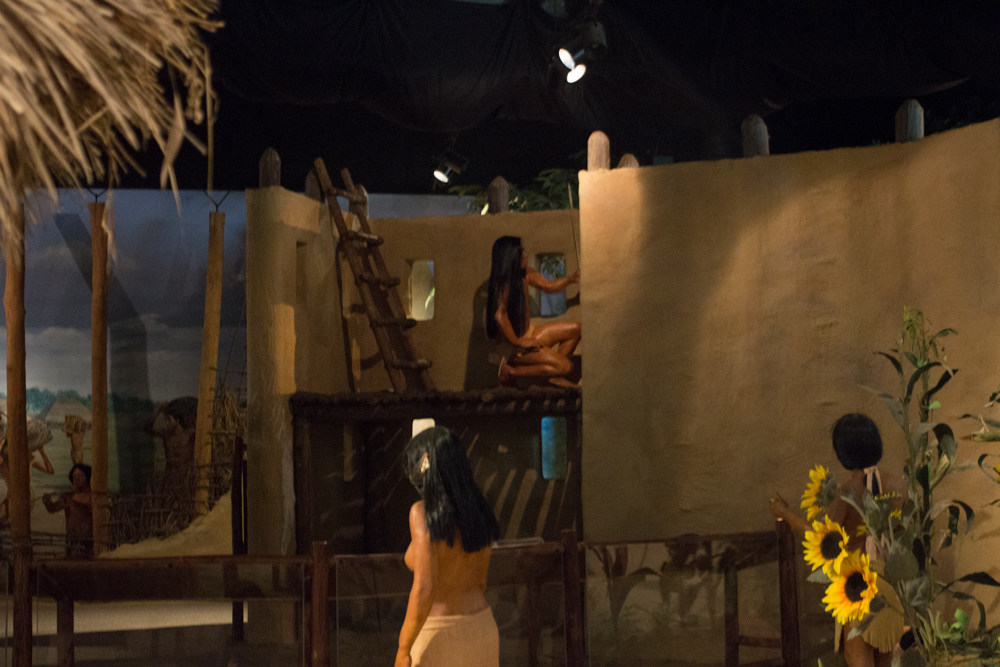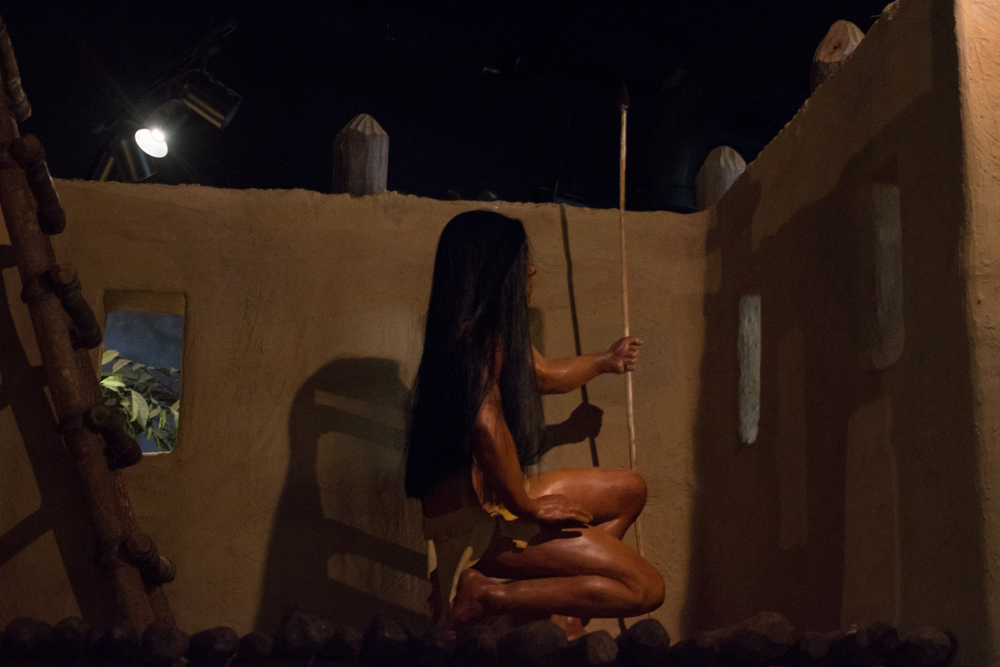While the rules governing marriage eligibility seemed to be strict among the Mississippian nobility, the common people were reported to enjoy more freedom and less ceremony by far. Especially the representatives of the fair sex.

In fact, it might seem that, while not enjoying the modern-day freedom of life choices, the women of the pre-contact Mideast were free to enjoy romantic encounters as many as they wished to have until committing to a life-changing decision such as marriage.
The “Luxembourg Memoir” published in 1752 states,
“… Those [women] who are not married have great liberty in their pleasures; no one can disturb them. Some are found whose chastity can not be shaken; there are some also who desire neither lovers nor husbands, although chastity among the savages is one of the least virtues. The greater number take good advantage of the liberty which custom gives them….”
Again, our main source of information on the possible daily life details of the 11th-13th centuries Mound Builders come from the later-day Lower Mississippi Valley’s dwellers, mostly the Natchez and their immediate neighbors, Tunihkas, Taënsa, Avoyel and a few other nations who spoke similar languages and had similar customs and a government that was surprisingly centralized and autocratic, with firm separation of classes that rarely characterized other North American peoples and nations of pre-contact times. A characteristic that of course suited well the great feats of engineering the Mound Builders of the earlier times left for us to marvel at. With no centralized government and the ability to organize and move – or maybe force – a great amount of people into transferring millions cubic feet of earth, clay and adobe it would prove difficult to erect wonders like the Cahokian mounds and many other remarkable earthworks.

But working life of the common people aside, when the Mississippian boy met the Mississippian girl and the sparks were to fly it seemed to be simple and uncomplicated on either part, with no ceremony and no taboos. As stated before, according to the early 18th century French sources, virginity was not valued in the Mississippian valleys at all, not among the regular people. Which of course might have given the girls and young women freedom of action akin to the one our modern western world enjoys at these days. Not that the French chronicles saw it in such a positive or approving light.
Besides the collective “Luxembourg Memoir,” another early 18th century French chronicle Charlevoix goes even further in his indignation: “… we know no nation on this continent where the female sex is more irregular than in this. They are even forced by the great chief and his subalterns to prostitute themselves to all comers, and a woman for being common is not the less esteemed…”
However, as always, Antoine-Simon Le Page du Pratz, who lived with the Natchez for many years and who did not seem to project his own foreign-to-the-people-he-writes-about upbringing into his writings, or at least who did so less than his other contemporaries, provides us with most detailed and interesting information.
“… When the boys and girls have arrived at the age of puberty they associate with each other familiarly, and have the liberty of doing so. The girls, forewarned that they will no longer be mistresses of their own hearts after they are married, know how to dispose of them to their advantage in forming their wardrobe as the price of their pleasures, for in that country, as elsewhere, the rule is nothing for nothing. Her intended, far from finding fault with this, on the contrary values his future wife in proportion to the fruits which she has produced…“However, after marriage, all this is changed; and, if we may believe the almost unanimous reports of our authorities, infidelity, except such as was commanded by the husband, was extremely uncommon on the part of married women and divorce nearly unknown. In the eight years in which I was their neighbor I saw only a single case. Then it was because the woman was very bad, according to the opinion of the Natchez as well as of the French. Each took the children of the same sex…”

So, it seems that until the decision to make a commitment, the girl was free to enjoy life as it was, whether inclined to romance and passion or to more pragmatic approach of amassing personal wealth and belongings by manipulating the more easily ignited or fooled among the masculine sex, with the society applauding her acumen instead of reproaching it.
However, once the girl made up her mind, her life would change dramatically in this aspect. Whether she met a boy she wished to have in her life for good, or if a promising man came to make a request on her behalf that her parents or rather grandparents approved, the life of romantic freedom would come to an end at this point.
Aside from Du Pratz, Andre Penicaut gives us the most interesting and relatively detailed account of the marriage custom among the Mississippian villagers or towns’ dwellers.
“… When a boy has determined to marry a girl, they go into the woods together, and while the boy is hunting the girl makes a cabin of boughs in the woods and lights a fire near the cabin. When the boy has returned from the chase, having killed a bison or a deer, he brings a quarter of it to the cabin, and then they go to search for the rest. After they have returned to the cabin they roast a piece of it, of which they make their supper, and the next day they together carry the products of the chase to their village, into the house of the girl’s father and mother. They inform the relatives, to each of whom is given a piece of game, which they carry to their houses. The boy and the girl dine with the father and mother of the latter, and finally the boy leads the girl away as his wife to his house, where she remains. Then it is no longer permitted her to go to the dances of the boys and girls, nor to have commerce with any man but her husband. She is obliged to work within the house. Her husband is permitted to repudiate her if he finds that she has been unfaithful to him, until she has a child by him…”
Le Petit backs this account with somewhat similar statements:
“… marriage is very simple. When a young man thinks of marrying he has only to address himself to the father of the girl, or if she have none, to her eldest brother, and they agree on the price, which he pays in skins or merchandise.Even when a girl has lived a licentious life, they make no difficulty in receiving her if there is the least idea that she will change her conduct when she is married. Neither do they trouble themselves as to what family she belongs to, provided she pleases them. As to the relatives of the girl, their only care is to inform themselves whether he who asks her is an able hunter, a good warrior, and an excellent workman. These qualities diminish the price which they have a right to ask on the marriage. When the parties have agreed, the future husband goes to the chase with his friends; and when he has sufficient either of game or of fish to feast the two families who have contracted the alliance, they assemble at the house of the parents of the girl. They particularly serve the newly married pair, who eat from the same dish. The repast being ended, the bridegroom smokes the calumet toward the parents of his wife, and then toward his own parents, after which all the guests retire. The newly married people remain together until the next day, and then the husband conducts his wife to the residence of her father-in-law, where they live until the family has built for him a cabin of his own. While they are constructing it, lie passes the whole day in the chase to furnish food, which he gives to those who are employed in this work…”
As always, Du Pratz’s account is most well-informed, detailed, fascinating and seemingly most reliable to read.
“… If a boy and a girl suit each other and they desire to marry, it is neither the fathers nor the parents, still less the mothers or the relations, who concern themselves in this matter. It is only the chiefs of the two families, who are ordinarily great-grandfathers and sometimes more. These two old men have an interview, in which, after the demand for the girl has been made on the part of the boy, they examine whether there is any relationship between the two parties who wish to marry and in what degree, for within the third degree, inclusive, they never marry. This interview of the old men assumes that the alliance suits them, and that already it has been agreed to by the fathers, grandfathers, and others as far up as the family chiefs, for if only one of them disapproves of it, it is never concluded…
“Boys rarely marry before having reached the age of 25. Before that age they are regarded as still too feeble, without understanding, and without experience. When the old men have agreed upon the marriage and have appointed the day, the necessary preparations to celebrate are made. The men go to hunt. The women prepare the maize and furnish the boy’s cabin as well as their skill and their means permit. The day agreed upon having come, the old man on the side of the girl comes out of his cabin and conducts the girl to that of the boy. The entire family follows in order and silently, and those who laugh do so only moderately. He (the old man) finds outside of the latter cabin all the relatives of the boy, who receive him and salute him with their common cries of joy, hou hou, many times repeated. He enters. The old man on the side of the suitor says, Caban-ancté , “ It is you,” to which he replies, Manatte, “Yes.” The first old man again begins to speak and, indicating with a joyful air the beds which serve as seats, says to him, Petchi, “ Sit down.”

“After this period of repose the old men rise, and making the intended bride and groom advance between them, ask them if they are satisfied to take each other and if they love each other. They make them see that they ought not to marry if they have not a sincere desire to live well together, that no one compels them to unite, and that, having taken each other by their own choice, they will be rejected from the family if they do not live together in peace. After this injunction the own father of the boy brings the present which his son is going to make and places it in his hands. The own father of the intended wife also advances and places himself at the side of his daughter. Then the boy says to his intended, “Do you wish to have me for your husband?” She answers, “ I indeed wish it and I am happy over it. Love me as much as I love you, for I do not love and I will not love any except you.” At these words the suitor covers the head of his affianced with the present which he has received from his father and says to her, “ I love you; that is why I take you for my wife, and here is what I give to your relations to purchase you.” Then he gives the present to the girl’s father.
The husband wears a tuft on the top of his hair which hangs over his left ear, to which is attached a sprig of oak leaves, and in his left hand a bow and arrows. The tuft rising up witnesses that he ought to be the master, the oak sprig that he does not fear to go into the woods nor to lie outside in order to hunt. The bow and the arrows signify that he does not fear the enemy and that he will always be prepared to defend his wife and his children. The wife holds in her left hand a little branch of laurel, and in her right an ear of maize, which her mother has given her at the time when she received, with her father, the present from her husband. The laurel signifies that she will always preserve a good reputation, and the ear of maize that she will take care of the household and prepare her husband’s meals.

The married couple having said what I have just repeated, the girl lets the ear of maize which she held in her right hand fall, and presents it to her husband, who takes it also in his right hand, saying to her, “ I am your husband.” She answers, “And I your wife.” Then the husband goes to grasp the hands of all of his wife’s family. Then he leads his wife to his family in order that she go through the same ceremony. Finally he conducts her toward his bed and says to her, “That is our bed. Take care of it,” which signifies that she is not to soil the nuptial couch. It is thus that native marriages are celebrated. I learned all these things from an old settler. The Tattooed-serpent allowed me to look on at one marriage. It is true that they ordinarily conceal themselves from the French, because they are apt to laugh at the least thing which appears extraordinary to them. Besides, these people are no more able to accommodate themselves than are all the other nations of the world to the liberties which the French take everywhere away from home. After the marriage celebration there is made a feast. Then they play, each according to sex and age, and finally toward evening they begin to dance and continue until daylight. The middle of the cabin is always free, because the beds of the family are ranged lengthwise along the walls…”
Du Pratz’s accounts come across as most detailed and most fascinating. He had lived among the Natchez for
Of course the reports again are very different when it comes to the nobility, especially the men among those.
According to Charlevoix:
“… the reason why there are few but the chiefs who have several wives is that, as they can get their fields cultivated by the people without any charge, their wives are no burden to them. The chiefs marry with less ceremony than the others. It is enough for them to give notice to the relations of the woman on whom they have cast their eyes that they place her in the number of their wives. But they keep one or two in their cabins; the others remain with their relations, where their husbands visit them when they please. No jealousy reigns in these marriages…”
Le Petit:
“The laws permit the Natchez to have as many wives as they choose. Nevertheless, the common people generally have but one or two. This, however, is not the case with the chiefs. Their number is greater, because having the right to oblige the people to cultivate their fields, without giving them any wages, the number of their wives is no expense to them. The marriage of the chiefs is made with less ceremony. They content themselves with sending to fetch the father of the girl whom they wish to espouse, and they declare to him that they will give her the rank of their wives. They do not fail, however, as soon as the marriage is consummated, to make a present to the father and mother. Although they have many wives, they keep but one or two in their own cabins; the rest remain at the houses of their parents, where they go to see them when they wish.”
Dumont:
“When a young savage wishes to marry a girl whose father and mother are still living, after having obtained her consent, he goes to make the demand for her from her parents. If they grant it to him he does not fail, some days afterward, to make a present to his future father-in-law of a gun, for example, and to his mother-in-law of a complete covering of Limbourg, and if the girl he is going to marry has sisters, it is also necessary for him to give them vermilion, beads, bracelets. In a word, before marrying he is obliged to make some present to all the nearest relatives of his intended. What is remarkable is that in spite of the corruption and libertinism which reign among the barbarians, the bond of marriage is much more respected by them than among more civilized people. With the exception of the great chief of the nation, who alone among them has the privilege of being able to marry many women, all the others have only one, and it is unheard of for separation and divorce to be spoken of. A savage is never seen to change the woman whom he has once married. He keeps her until death.”
As stated in the previous article, the Sun, his family and his nobles lived very different lives. But it seems that the lower classes did not practice polygamy, or did so sparingly, according to their ability to support an extended family. Not an easy task at times, not when it came to a hard working farmer.
Comments
No Comments to “When a Mississippian Boy Meets a Mississippian Girl”